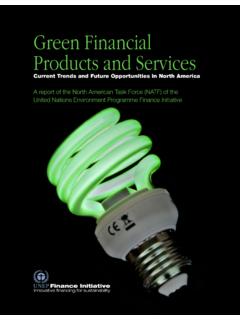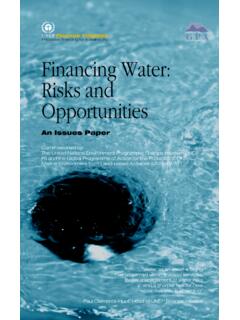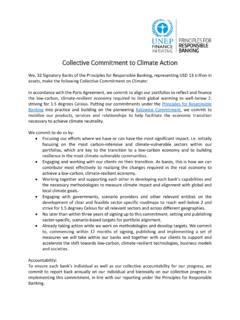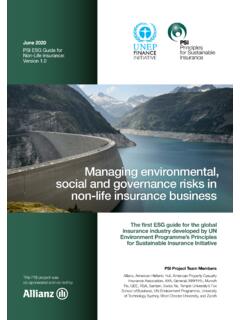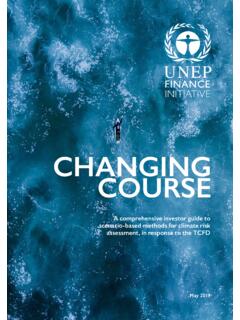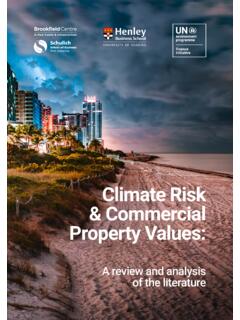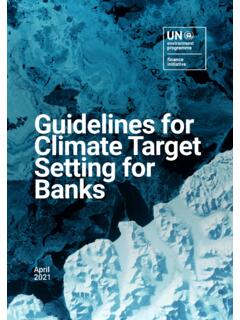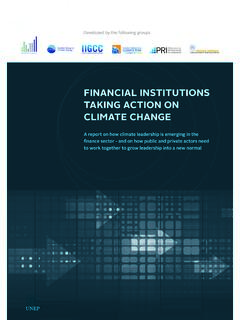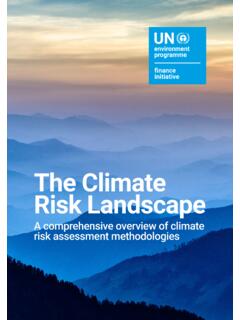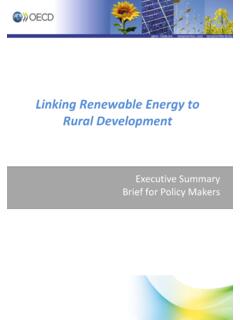Transcription of Insuring the climate transition - Finance Initiative
1 Insuring the climate transitionThe final report on the project of UN Environment Programme s Principles for Sustainable Insurance Initiative to pilot the TCFD recommendationsJanuary 2021 Insuring the climate transitionEnhancing the insurance industry s assessment of climate change futuresPublished by UNEP s Principles for Sustainable Insurance Initiative in January 2021 Copyright United Nations Environment Programme, 2021 This publication may be reproduced in whole or in part and in any form for educational or non-profit purposes with-out special permission from the copyright holder, provided acknowledgement of the source is made. The United Nations Environment Programme would appreciate receiving a copy of any publication that uses this publication as a source. No use of this publication may be made for resale or for any other commercial purpose whatsoever without prior permission in writing from the United Nations Environment Programme.
2 DisclaimerThe designations employed and the presentation of the mate-rial in this publication do not imply the expression of any opinion whatsoever on the part of the United Nations Envi-ronment Programme concerning the legal status of any coun-try, territory, city or area or of its authorities, or concerning delimitation of its frontiers or boundaries. Moreover, the views expressed do not necessarily represent the decision or the stated policy of the United Nations Environment Programme, nor does citing of trade names or commercial processes constitute United Nations Environment Programme (UNEP) promotes environmentally sound practices globally and in its own activ-ities. UNEP s policy is to specify vegetable-based printing inks and chlorine-free paper using recycled fibre and wood pulp from sustainable forests. Our distribution practices aim to reduce UNEP s carbon No:978-92-807-3822-3 Job No:DTI/2320/PAInsuring the climate transitionContentsAbout UN Environment Programme s Principles for Sustainable Insurance Initiative .
3 IvAcknowledgements ..vForeword ..1 Executive summary ..2 Scope of the study ..2 Forward-looking climate change scenarios ..3 Observations by risk category ..4 Future opportunities ..71. Introduction: climate change financial risk categories and the need for an integrated approach ..82. The approach to physical risk assessment .. Define scope of analysis .. Define impact pathways .. Obtain climate data .. Develop modelling approach .. Construct and test model .. Key takeaways ..423. The approach to transition risk assessment .. Define scope of analysis .. Define impact pathways .. Obtain climate data .. Develop modelling approach .. Construct and test model .. Key takeaways ..724. The approach to litigation risk assessment .. Definition of litigation risk .. Stress testing approach .. Risk assessment methodology .. Key takeaways ..885. Conclusions ..89 Annex 1: The Principles for Sustainable Insurance.
4 91 Annex 2: Summary of key cases/areas of concern for private sector defendants ..93 Principles for Sustainable InsuranceivAbout UN Environment Programme s Principles for Sustainable Insurance InitiativeEndorsed by the UN Secretary-General and insurance industry CEOs, the Principles for Sustainable Insurance (PSI) serve as a global framework for the insurance industry to address environmental, social and governance (ESG) risks and opportunities and a global Initiative to strengthen the insurance industry s contribution as risk managers, insurers and investors to building resilient, inclusive and sustainable communities and economies on a healthy by UN Environment Programme s Finance Initiative , the PSI was launched at the 2012 UN Conference on Sustainable Development (Rio+20) and has led to the largest collab-orative Initiative between the UN and the insurance vision of the PSI Initiative is of a risk-aware world, where the insurance industry is trusted and plays its full role in enabling a healthy, safe, resilient and sustainable society.
5 Its purpose is to better understand, prevent and reduce ESG risks, and to better manage opportunities to provide quality and reliable risk The Principles for Sustainable Insurance provide a global roadmap to develop and expand the innovative risk management and insurance solutions that we need to promote renewable energy , clean water, food security, sustainable cities and disaster-resilient communities. UN Secretary-General (June 2012) Insuring the climate transitionvAcknowledgementsUN Environment Programme s Principles for Sustainable Insurance Initiative (PSI) is indebted to each of the 22 lead-ing insurance and reinsurance companies worldwide and their respective representatives who formed part of the PSI TCFD pilot group and made this collaborative project possi-ble. They contributed invaluable insights to this pioneering project by participating in numerous meetings, document reviews, and internal model testing.
6 PSI TCFD pilot group members Allianz (Germany): Thomas Liesch, James Wallace Aviva (UK): Ben Carr, Zelda Bentham, Chris Boss, Bianca Hanscombe, Finn Clawson, Adrian Whitaker, Claire Vedrenne, Masani Panigrahi AXA (France): Suzanne Scatliffe, Tom Philp, Andrew MacFarlane, Owen Dacey, Sylvain Vanston Desjardins (Canada): J r me Petigny, Mathieu Francoeur, Barth l my Mahieu Generali (Italy): Alessandro Porta, Lucia Silva, Andrea Mosca, Marta Pagan IAG (Australia): Julie Batch, Ramana James, Mark Leplastrier, Brooke Pettit, Nicholas Stacher ICEA LION (Kenya): Paul Muthaura, Dorothy Maseke, Martin Kariithi, Joy Omondi Intact (Canada): Dan Fedus, Jonathan Gadoury, Laura Willett, Mandy Dennison, Mark Yorsaner, Maxime Rousseau Turenne L nsf rs kringar Sak (Sweden): Carina Bodesand, Gertrud Henriksson, Julia Bergqvist, Jens Holmberg, Filip Ahlin, Stefan Schneider, Anders Nises, Ieva Gediminaite, Henrik Mel n Lloyds Banking Group (UK): Graeme Andress, Kevin Treco, Dimosthenis Tsaknias, Emily White MAPFRE (Spain): Jos.
7 Ca izares Fern ndez, Miriam Garc a Reigosa, Sara Fern ndez Quintano, F lix Condes Novillo, Pablo Bohdan Maksymenko MS&AD (Japan): Yasumasa Kanie, Keita Uehara Munich Re (Germany): Philipp Hasenmueller, Renate Bleich, Eberhard Faust, Stephan Laemmle, Heike Markus, Ina Ebert, Julia Schubring-Giese NN (The Netherlands): Naomi Tronco, Sebastian Rath, Rayna Boxill, Shalabh Mathur, Fleur Hudig, Nathalie van Toren QBE (Australia): Sharanjit Paddam, Serena Blanch, Sereina Pfister, Monica Dasgupta, Janette O Neill, Joan Cleary, Eric Letourneau, Carol Zacharias Sompo Japan (Japan): Yukio Hori, Kanako Murakami, Shinya Ishikawa Storebrand (Norway): Bart Bisschops, Peter Natas, Caroline Johansen Swiss Re (Switzlerand): Lasse Wallquist, Nora Ernst, Martin Weymann, Thierry Corti TD Insurance (Canada): Huma Pabani, Moira Gill, Frank Yang, Kris Bagchi, Patricia Therrien The Co-operators (Canada): Chad Park, Wendy Perkins, Eliot Gregoire, Barbara Turley-McIntyre Tokio Marine (Japan): Masaaki Nagamura, Hiroo Shimada Zurich (Switzerland): Daniel Eherer, John Scott, Guido Felder, Rochus TrogerUNEP project teamButch BacaniRemco FischerManuel LonfatCo-Project Lead & Chief EditorCo-Project LeadRisk Analytics Lead & Project ManagerProgramme LeaderClimate Change LeadTCFD Project ManagerUNEP PSIUNEP FIUNEP PSIO livia FabryRobert WilsonSarah Tang & Diana DiazProject CoordinatorGraphic DesignerProject AssistantsProgramme SupervisorGraphic Design LeadProgramme AssistantsUNEP PSIUNEP FIUNEP PSIP rinciples for Sustainable InsuranceviProject contributorsThis project was advised and reviewed by PricewaterhouseCoopers GmbH WPG (Germany) with support from PricewaterhouseCoopers LLP (UK) and Pricewaterhouse-Coopers AG (Switzerland).
8 Nicole R ttmerJon WilliamsAntonios KoumbarakisPartnerPartnerDirectorSustain ability & climate Change Lead EuropePwC GermanySustainability & climate ChangePwC UKStrategic Regulatory & Sustainability ServicesPwC Switzerland Anne Michaels, Annalee Dale McWilliams, Jitao Wang, Katharina Trachmann, Mark-Philipp Kielgast, Maya McFann, Rachel Watson, Sofia Tsankova, Susanne LenzThe work on climate change-related litigation risks for this project was also supported by the Sabin Center for climate Change Law at Columbia University in the BurgerMichael GerrardDaniel MetzgerExecutive DirectorFaculty Director climate Law FellowSabin Center for climate Change Law & Senior Research Scholar at Columbia Law SchoolSabin Center for climate Change LawSabin Center for climate Change Law & Postdoctoral Research Scholar at Columbia Law SchoolThe work on climate change-related litigation risks for this project also benefitted from the own work on the topic by the Bank of England s Prudential Regulation Claus Mathesh SriprabaTechnical Head of Insurance Analyst, Insurance Analytics Division Prudential Regulation Authority Prudential Regulation AuthorityBank of EnglandBank of EnglandProject supportersFinally.
9 The PSI would like to thank the COP26 Private Finance Hub for its support for this project. Harriet Richards, Ronan Hodge, Jennifer Bell, Sini Matikainen Insuring the climate transition1 ForewordIn 2015, when I first spoke about the Tragedy of the Hori-zon , my chosen audience was insurers, which was then the one group in the financial sector that had the perspective to begin managing climate -related financial risks. To help broaden that perspective, I advocated for greater transpar-ency on climate risks so that the broader financial sector could assess and respond more effectively and efficiently. Not long after, the Financial Stability Board set up the Task Force on climate -related Financial Disclosures (TCFD) to address this issue head then, the climate agenda has moved significantly in the worlds of public policy, business and Finance . World lead-ers forged the Paris Agreement, the IPCC provided clarity on the need to progress to net-zero emissions, and the TCFD published recommendations that led to real momentum in strategic, forward-looking, decision-useful disclosures by financial institutions and companies in the real economy.
10 In addition, there is an increasing weight of public pres-sure from legislative change, technology and stakeholder demands across regions in driving the transition to net zero. There are 126 countries and counting, that now have net-zero commitments, including three global giants China, Japan and South Korea announcing their commitments in the last few months. But in order to meet net zero, we must transition the whole economy that means every company, bank, insurer and investor must adjust their business models, develop credible plans for the transition and imple-ment them. For private markets to anticipate and smooth the transition to a net-zero world, they need the right frame-works across reporting, risk management and returns. By COP26, these frameworks must be built so that every profes-sional financial decision takes climate change into account. In order to bring climate risks and resilience into the heart of financial decision-making, climate disclosure (reporting) must become comprehensive; climate risk management must be transformed, and sustainable investing (returns) must go mainstream.
